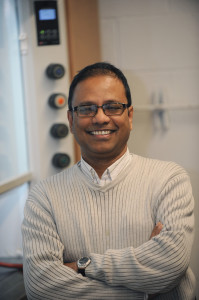

By Casey Chafin | For the Duquesne Duke
Professors from three Pittsburgh universities gathered at Duquesne’s Power Center Ballroom last week to present their research and inventions during an event called “Discovered in PA, Developed in PA.”
The event included professors from Duquesne, Carnegie Mellon University and the University of Pittsburgh, according to Alan Seadler, associate academic vice president for research and technology at Duquesne.
The professors received funding for their ideas through Innovation Works, a company that provides funding for startup company ideas in southwestern Pennsylvania. Seadler described Innovation Works as “the bridge in the gap between an early idea and a company beginning to emerge on its own.”
Two Duquesne professors presented at the event. Computer science professor Patrick Juola shared his technology that identifies variations in people’s writing. Juola used the software in 2013 to determine that the author of the novel The Cuckoo’s Calling was actually J.K. Rowling under a pseudonym.
Chemistry and biochemistry professor Partha Basu presented his idea for a compound that detects lead at low concentrations.
“Lead is one of the persistent problems in the United States and the world,” Basu said.
The compound allows lead to give off a different light depending on the amount of present in a material. Basu said that detecting lead will be helpful for keeping it out of our water supply as well as treating gunshot wounds, which often leave trace amounts of lead in the victim’s body.
When asked how close the project is to being available for real-world application, Basu said the science is already there.
“I am a scientist,” Basu said. “The next step is to attract the business people to lead the way.”
The focus of the conference was to do just that: bring the business side of projects like this up to speed, according to Basu.
Investors who had contributed to some of the projects attended the event, as did potential future investors, Seadler said.
Seadler noted the importance of Duquesne’s involvement in the event. According to him, Carnegie Mellon and Pitt have participated in events such as this for some time; however, this is one of the first entrepreneurship events in which Duquesne has been involved.
“It represents a horizon for Duquesne University as a research university,” Seadler said.
The event marks the first time this particular group of researchers has met to discuss ideas. Seadler said Duquesne has already applied for another grant to sponsor future events.



